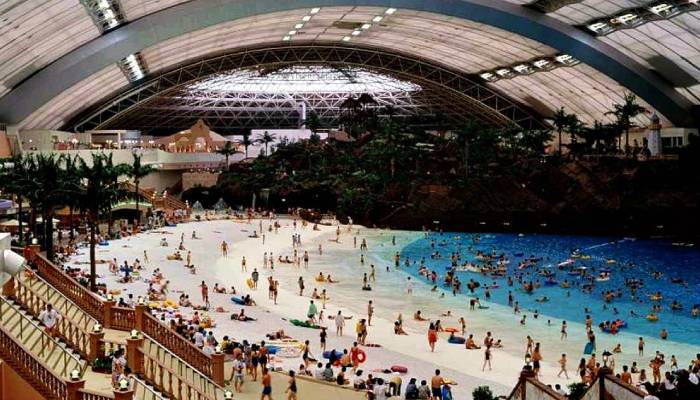Man-made beaches are becoming increasingly popular in various parts of the world, such as Monaco, Berlin, Hong Kong, and Toronto.
These artificial beaches offer people the chance to enjoy a beach-like experience without having to travel to a natural coastal location.
The Rise and Fall of the Seagaia Ocean Dome:
The largest artificial beach in the world was the Seagaia Ocean Dome, located in Miyazaki, Japan.
It was built at a staggering cost of $1.8 billion, considered an incredibly high amount at the time it was constructed.
The Ocean Dome, located at the Sheraton Seagai Resort, was 300 meters long and 100 meters wide.
It also had the world’s largest retractable roof, which could open or close depending on the weather.
The Ocean Dome had a sandy beach covering 12,000 square meters, made by crushing 600 tonnes of stones imported from China.
Additionally, it contained a large artificial ocean six times the size of an Olympic swimming pool, filled with 13,500 tonnes of unsalted, chlorinated water.
The Ocean Dome also had artificial palm trees and a fake volcano that erupted every 15 minutes.
In addition to the Dome, the resort included five hotels, various sports facilities, golf courses, botanical parks, and a zoo.
The Ocean Dome maintained a warm and comfortable environment, with the air temperature set around 30°C and the water temperature at 28°C.
The dome also had a wave machine that could create 200 different types of waves.
Seagaia Dome: Largest Man-Made Beach That Ended in Ruins
Created by Mitsubishi Heavy Industries, the Ocean Dome opened in 1993 and became widely popular.
However, despite its beauty, the Dome failed to become financially successful. In February 2001, the Seagaia resort, which included the Dome, went bankrupt.
It was then purchased by Ripplewood, an American private-equity fund, for less than 10% of the original cost to build and renovate it.
Even after the resort was renovated, the hotel faced significant financial troubles, and later, the Dome was demolished in 2017.



